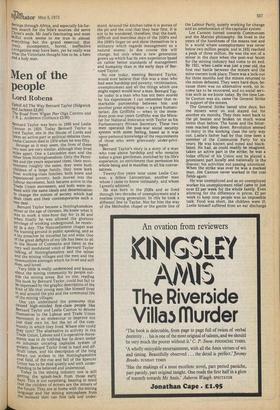Livings tonian faults
Jan Morris
Livingstone Tim Jeal (Heinemann £3.75) That Doctor Livingstone was crazy is an old theory. That he was nasty has long been alleged. That he was incompetent has often been suggested. That he was a failure is old hat. That he was crazy, nasty, incompetent and a failure is a multiple proposition only recently advanced, as the most holy of Victorian heroes approaches the centenary of his apotheosis, and his statutory debunking. Mr Tim Jeal's remarkable new biography is far more than a crude demolition, but it certainly brings out the worst in Livingstone, and seeks deliberately to topple from its frame Henry Stanley's reverent portrait of the saintly explorer, supplicant natives grateful at the top, Bible open at the bottom, texts and angels all around.
Not, as I say, that the staples of the book are new. Livingstone was clearly an obsessive, not merely in his Christian zeal, but in his frequently preposterous exploratory decisions and enthusiasms. He was in many ways a singularly unpleasant person—heartless, selfish, arrogant, quarrelsome. He was a rotten expedition leader, at least when commanding Europeans His attempt to establish a European colony high up the Zambezi was based upon false optimism and ended a tragic catastrophe: his quest to find the source of the Nile was based upon delusion and ended a fatal flop.
So much has been said before. Mr Jeal's achievement is to substantiate the charges with a chill mass of detail and some striking conclusions. He has had access to unpublished material, and to many scholarly works unavailable to previous biographers, and he has produced a rich and readable book, written in an unremarkable prose but piling evidence so massively upon evidence that one is left with the impression of a huge anti-monument, an un-obelisk or a non-pillar. Mr Jeal tens us tnat ne is tne tirst layman to write a full biography of the Reverend Doctor, but there is a suggestion of anathema to his arguments, all the same, as though he is excommunicating a myth.
Most people will enjoy most, in a shamefaced sort of way, the picture Mr Jeal paints of Livingstone's private life. How delightful to read of this well-known saint, setting off on a Christian mission into the savage heart of Africa, brutally taking with him his three children, aged four, three and one, and his five-month pregnant wife — " It was the first death in our family," he remarked when the new baby died screaming, "but just as likely to have happened if we had stayed at home, and we now have one of our number in heaven "! What fun to hear of this reverend gentleman swopping Glasgow obscenities with his own brother, telling lies, callously dismissing other peoples' misfortunes, driving his eldest son to an early death and his wife to alcoholism! This is the very stuff of debunkery, and Strachey himself could hardly have handled it better.
At the same time the misapplications of Livingston's life cast a dismal fascination upon the reader. What was it all about? Livingstone went to Africa as a Christian evangelist, but converted only one African in thirty years, and even he defected. His heroic journeys seem all too often to have had hallucinatory properties, journeys for journeying's sake, delusory objectives, errors rationalised — an endless ghastly meander through the African wastelands, from the Kalahari to the Great Lakes, from the east coast to the west. The Victorians thought it a life Of sacrifice, dedicated to Christ: Mr Jeal presents it more as a life of psychotic selfindulgence, dedicated to Dr Livingstone.
But brilliant though the book is in prosecution, it is less effective in defence. Mr Jeal is a polemicist, and his faults are, as it happens, rather Livingstonian faults. He marshals his arguments too tightly, just as the Doctor preferred not to hear contradictory evidence. He is never less than honest, but he is inclined to score off previous biographers, as Dr Livingstone snubbed or belittled his rivals, and he records the merits of Livingstone's character with more diligence than conviction. "Livingstone was a great man," he assures us in the latter part of his book, and the affirmation is timely, for by then most of his readers will have begun to doubt it.
I think he misses Livingstone's magic. Like it or not, it was there. It Is unfair to imply that Livingstone's popularity in England was all trumped-up or ill-informed, and wrong to dismiss in a couple of lines his celebrated (and momentous) appeal to the undergraduates of Cambridge — " Do you carry out the work which I have begun! I leave it with you!" Livingston may have antagonised many of his countrymen, as he has clearly antagonised Mr Jeal, but he-inspired many more to emulation; one of his oldest and bitterest opponents, indeed, underwent so miraculous a change of heart in the middle of Livingstone's funeral that he founded the Nyassa mission in the Doctor's memory — the beginning of Britain's empire in Central Africa, and the origin of Malawi.
More unseemly still is Mr Jeal's somewhat casual acceptance of Livingstone's supreme, if posthumous, achievement, the ending of the Central African slave trade — as splendid a memorial as a man could have, and one of the noblest consequences of British power. But the truth is that the elimination of this ancient curse restores the frame to that lithograph after all, and vindicates Stanley's most gullible intuitions. Livingstone's life did have a purpose, and it was fulfilled. His wan
derings through Africa, and especially his forlorn search for the Nile's sources, did serve Christ's ends. Mr Jeal's fascinating and most Skilful work seems to me true in almost everything but the grand essential: that crazy, incompetent, horrid, ineffective, Livingstone may have been, yet he really was What the Victorians thought him to be, a hero and a holy man.



































 Previous page
Previous page